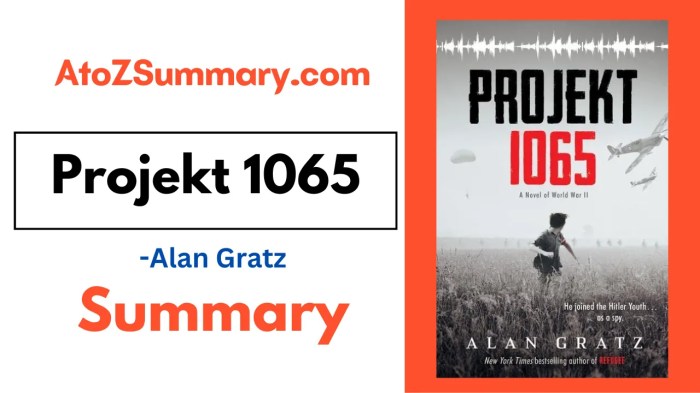Summary of grenade by alan gratz – Alan Gratz’s “Grenade” emerges as a compelling narrative that delves into the profound impact of war through the symbolic lens of a grenade. This meticulously crafted novel unveils the grenade’s transformative journey, profoundly shaping the lives and choices of its characters.
The novel is meticulously set against the backdrop of World War II, capturing the horrors and realities of warfare. Gratz deftly weaves historical context into his storytelling, highlighting the significance of grenades in combat and the novel’s authentic portrayal of the period.
Summary of Grenade
In Alan Gratz’s novel “Grenade”, the titular object serves as a potent symbol of the horrors of war and the devastating impact it has on human lives. The grenade’s journey through the story mirrors the experiences of the characters, who are forced to confront the brutality and futility of conflict.
The Grenade’s Journey
- Initially owned by a German soldier, the grenade is passed among various characters, including a young boy named Henry and an American soldier named Ray.
- Each time the grenade changes hands, it represents a different perspective on the war and the choices that must be made in the face of violence.
- The grenade ultimately explodes in the hands of a young girl, symbolizing the tragic and senseless loss of innocent lives.
Impact on Characters
The grenade has a profound impact on the characters’ lives and decisions. Henry, initially eager to join the war effort, becomes disillusioned after witnessing the horrors of combat.
Ray, haunted by the guilt of killing civilians, struggles to find redemption. The grenade’s presence forces the characters to confront their own mortality and the moral dilemmas posed by war.
Historical Context
The novel “Grenade” is set during World War II, a conflict that had a devastating impact on the world. Grenades were a common weapon used by both sides during the war, and their destructive power is vividly portrayed in the novel.
Role of Grenades in Warfare, Summary of grenade by alan gratz
- Grenades were used to clear enemy trenches, destroy fortifications, and kill soldiers in close combat.
- They were often the weapon of choice for surprise attacks and ambushes.
- The novel accurately depicts the horrors of grenade warfare, including the gruesome injuries and psychological trauma it caused.
Character Analysis

The characters in “Grenade” are complex and multifaceted, each with their own motivations and actions in relation to the grenade.
Henry’s Connection to the Grenade
- Henry’s initial enthusiasm for war is shattered when he witnesses the devastating effects of the grenade.
- The grenade becomes a symbol of his disillusionment and the loss of innocence.
- Henry’s struggle to come to terms with the horrors of war mirrors the experiences of many soldiers during World War II.
Ray’s Connection to the Grenade
- Ray is haunted by the guilt of killing civilians with a grenade.
- The grenade represents his desire for redemption and his search for meaning in the midst of chaos.
- Ray’s journey is a testament to the psychological toll that war can take on soldiers.
Themes and Symbolism

The novel “Grenade” explores several major themes through the use of the grenade as a symbol.
Violence and Destruction
- The grenade is a potent symbol of the violence and destruction that war brings.
- Its explosive power represents the devastating impact of conflict on human lives and society.
- The novel shows how war can corrupt and destroy even the most innocent of souls.
Redemption
- Despite the darkness and despair, the novel also offers a glimmer of hope.
- Ray’s search for redemption shows that even in the midst of war, it is possible to find meaning and purpose.
- The novel suggests that redemption is possible through acts of compassion and forgiveness.
Literary Techniques: Summary Of Grenade By Alan Gratz
Alan Gratz uses a variety of literary techniques in “Grenade” to convey the novel’s message and create a powerful emotional impact.
Foreshadowing
- The novel uses foreshadowing to hint at the tragic events that will unfold.
- For example, the description of the grenade’s destructive power foreshadows the devastating impact it will have on the characters’ lives.
- The use of foreshadowing creates a sense of suspense and anticipation, drawing the reader into the story.
Symbolism
- The grenade is a powerful symbol that represents multiple themes and ideas throughout the novel.
- It is a symbol of violence, destruction, and redemption, among other things.
- Gratz’s use of symbolism adds depth and complexity to the novel, allowing readers to interpret the story on multiple levels.
Impact and Legacy
Alan Gratz’s “Grenade” has had a significant impact on readers and has become a valuable addition to the literature of World War II.
Enduring Relevance
- The novel’s themes of violence, redemption, and the horrors of war continue to resonate with readers today.
- It is a powerful reminder of the devastating impact that war can have on human lives.
- The novel has been used in schools and universities to teach about World War II and the importance of peace.
Influence on Popular Culture
- “Grenade” has been adapted into a stage play and a short film.
- The novel has also been cited as an influence on other works of literature and popular culture.
- Its enduring legacy is a testament to its power and relevance.
Question Bank
What is the central theme of “Grenade”?
The novel explores the destructive power of war, the resilience of the human spirit, and the transformative nature of redemption.
How does the grenade symbolize violence and destruction?
The grenade serves as a physical manifestation of the devastation and suffering caused by war, leaving a trail of shattered lives and broken dreams.
What is the significance of the characters’ connection to the grenade?
Each character’s interaction with the grenade reflects their own experiences and perspectives on war, shaping their motivations and choices.